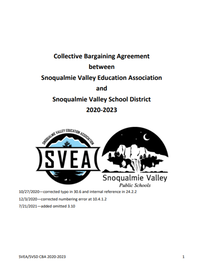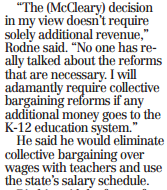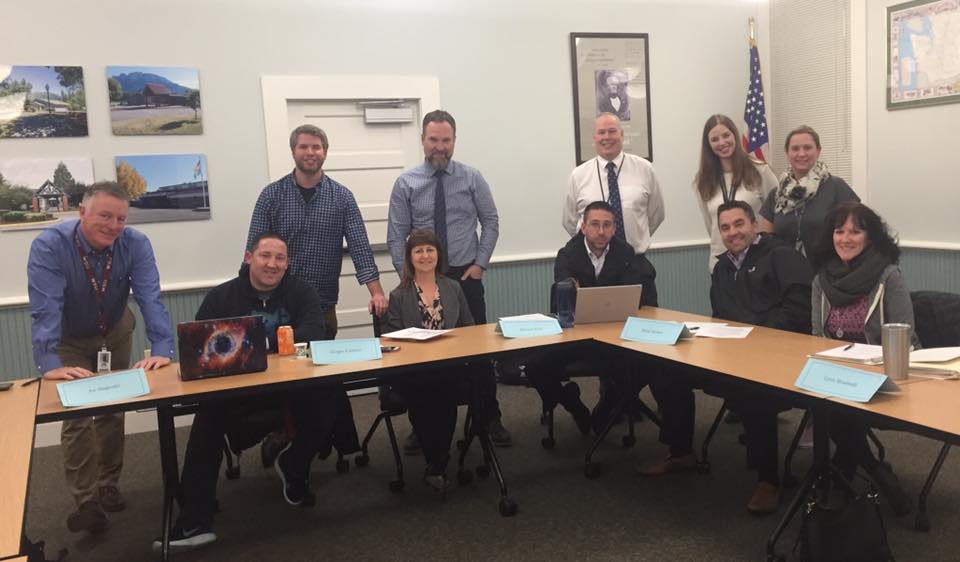Why Collective Bargaining?
 col·lec·tive bar·gain·ing (noun):
negotiation of wages and other conditions of employment by an organized body of employees.
col·lec·tive bar·gain·ing (noun):
negotiation of wages and other conditions of employment by an organized body of employees.
Perhaps the greatest areas where you can exercise the power of standing united is in your own local bargain. Collective bargaining is your opportunity to have an equal voice in wages, hours and working conditions - offering the chance to make significant improvements to your classroom and work environment. Educators have a vital voice that must be heard in shaping our schools and colleges. After all, a teacher's working conditions are a student's learning conditions. Our current collective bargaining agreement (CBA) can be found here.
Over the past few bargains, SVEA members have used the collective bargaining process to gain:
Beyond collective bargaining, the bargaining team will continue to represent SVEA interests, needs, and issues during meetings of the Mutual Interest Committee (MIC). This joint SVEA/SVSD committee continues to meet during the length of the contract to reach solutions to issues that arise.
Over the past few bargains, SVEA members have used the collective bargaining process to gain:
- first-ever class size limits for our elementary school students and caseload limits for special education teachers and therapists
- attract & retain stipends for all educators to make our pay more competitive with our neighbors
- local insurance pool to supplement inadequate state health benefit funding
- increased planning time at the elementary level
- compensation for the time needed to integrate technology into our lessons
- tuition reimbursement for professional certification, national boards, and master's degrees
- use of personal days around holidays and vacations
- and much more.
Beyond collective bargaining, the bargaining team will continue to represent SVEA interests, needs, and issues during meetings of the Mutual Interest Committee (MIC). This joint SVEA/SVSD committee continues to meet during the length of the contract to reach solutions to issues that arise.
Threats to Collective Bargaining
Because of our success in negotiating pay raises and improved working/learning conditions, our freedom to collectively bargain with our employers is under attack. Some politicians and political groups, including school boards, school administrators and the Freedom Foundation, are lobbying the Legislature to eliminate or limit local bargaining for Time Responsibility and Incentive (TRI).
They want to force all K-12 school employees to negotiate pay and benefits with the state instead of their local school districts.
Given the state’s dismal track record on school funding, SVEA members are adamantly opposed to statewide bargaining. McCleary requires the state to increase funding for basic education – it does not require limiting our local bargaining rights.
They want to force all K-12 school employees to negotiate pay and benefits with the state instead of their local school districts.
Given the state’s dismal track record on school funding, SVEA members are adamantly opposed to statewide bargaining. McCleary requires the state to increase funding for basic education – it does not require limiting our local bargaining rights.
Local Politicians Are Attacking Collective BargainingLocal 5th LD Reps. Magendanz (former) and Rodne (former) would both like to use McCleary as cover to restrict our collective bargaining rights.
Snoqualmie Valley Education Association members must remind legislators that:
|
It's Already Happened Around the CountryIn 2011, the lives of Wisconsin educators changed overnight. Wisconsin is not alone. Attacks on collective bargaining rights have taken place in Indiana and Ohio, too, as have attacks on tenure, retirement and other important issues. In Wisconsin, contracts were replaced with highly restrictive policy handbooks. Take home pay decreased by $2,000-$5,000. We can learn from Wisconsin.
|
Bargaining Team
The 2020 SVEA Bargaining Team was comprised of (in alphabetical order):
- Lynn Bradwell, CKMS Teacher
- Joe Baginski, MSHS Teacher
- Amy Jones, FCES Instructional Coach
- Tony Manjarrez, CKMS Teacher
- Jada Walker, WEA-Sammamish Council Staff
- Nate Ziemkowski, SES Teacher
|
Working on the administration team during 2020 negotiations were (in alphabetical order):
Dates of all scheduled bargaining sessions and Mutual Interest Committee (MIC) meetings can be found on the Calendar page. |









